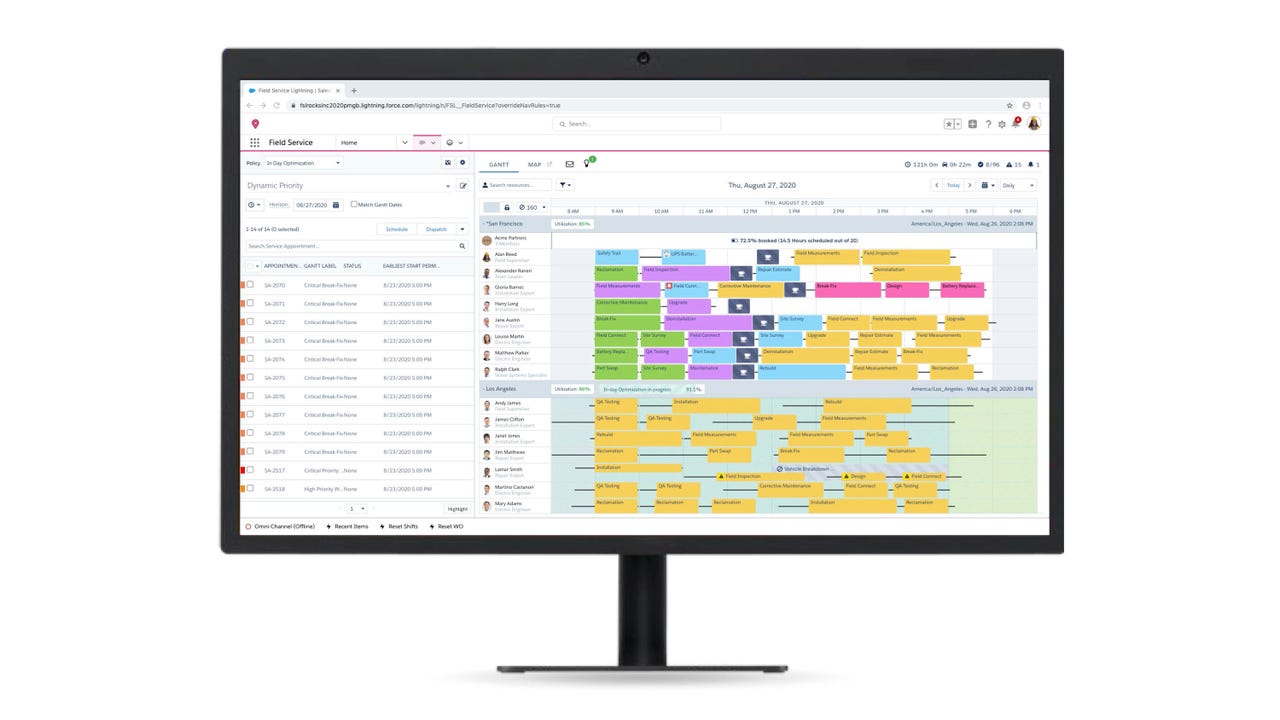Salesforce updates Field Service as customers respond to COVID-19 conditions

Salesforce on Tuesday announced a series of updates to Field Service, its platform for dispatching and managing field service technicians. Field Service is one of Salesforce's fastest-growing product ever -- but the product has seen some significant swings in demand since the outbreak of the COVID-19 pandemic. Now, as enterprises seek to address a backlog of service needs, the latest updates are all the more compelling, Salesforce says.
"The reality is, even with all of us working from home, work in the physical world still has to happen," Eric Jacobson, VP of Field Service Product Management at Salesforce, said to ZDNet. "There's a backlog of work that has to be done. Hospitals still have equipment that needs to be up and running, apartment buildings have elevators that need to be maintained. At home, if your washing machine breaks, you need someone to replace the washing machine. But you want to do so safely... So it creates new opportunities for us."
The new features include:
- Intelligent appointment scheduling and schedule optimization capabilities
- AI-driven recommendations that ensure technicians have the right parts and equipment
- Insights into how assets are performing and which ones require maintenance
- New tools that let an organization's customers know more precisely when their technician will be arriving
The first two new features -- dynamic scheduling and technician recommendations -- are about "getting the right resources to the right job at the right time," Jacobson said. Ultimately, he argued, that can help technicians get a job done in one visit -- something that's become more imperative during the pandemic.
"It'S always annoying when someone has to come back for a second appointment, but now there's a safety aspect to it," Jacobson said.

The new Field Service dynamic dispatcher console
Here's how dynamic scheduling works: an organization may place a field service visit on the books for, say, an elevator inspection months in advance. While not initially a high priority, the visit becomes more important as the inspection deadline draws near. The new scheduling feature can take into account that kind of urgency to optimize technicians' schedules. Dynamic Priority will be generally available in October.
Meanwhile, the new technician recommendations leverage Salesforce's Einstein AI platform to analyze past work orders. The feature, called Recommendation Builder, can use that information to recommend parts and tools that are likely to be needed. Recommendation Builder will be in beta in October.
For insights into asset performance, Salesforce worked with longtime partner ServiceMax to build the Asset 360 tool. It offers a set of asset management capabilities, with visibility into installed assets, service contracts and asset performance. Asset 360 will be generally available in November.
The new Field Service Appointment Assistant
Lastly, the new Appointment Assistant tool uses live status updates and GPS to help customers track when a technician will arrive. Customers can click on a URL to track the technician, much in the same way they may track an Uber driver. Appointment Assistant will be in a closed pilot in the US in October.
The new features follow a resurgence of interest in Field Service. The product saw a dip in usage in March, Salesforce said, when the COVID-19 outbreak in the US effectively halted service visits. That left a backlog of service requirements that needed to be fulfilled. Between April and July, Field Service saw a more than 50 percent jump in usage. It's now being used 20 percent more than at pre-COVID levels.
Jacobson said he expects to see continued interest in Field Service, even after the impact of the pandemic has subsided. "More and more customers are recognizing that the opportunity to deliver that last mile of service is a the differentation" for them, he said.